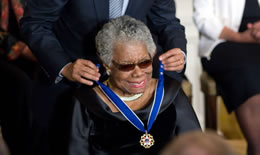Notable author, poet and educator left a beautiful mark on all those interested in becoming lifelong learners
Wh en I heard about Maya Angelou’s passing today (May 28th), I was currently getting a bad cavity filled, an extremely dispassionate process framing an emotional response I wasn’t quite prepared for.
en I heard about Maya Angelou’s passing today (May 28th), I was currently getting a bad cavity filled, an extremely dispassionate process framing an emotional response I wasn’t quite prepared for.
As an English major, the path I’m currently on in my life as journalist, editor, and (hopefully) one-day novelist, has been spurred by collections of books and poems—the passions of life made tangible in structures and syntax, and the brave and humble authors who have made these experiences available to me.
One of my favorite books I read in my high school AP English class was I Know Why the Caged Bird Sings, and not because I can necessarily relate to the experiences outlined in a book known to be one of Angelou’s autobiographies, but because of the foreign and vibrant world it exposed—a cultural and literary expedition brought about through a strong female protagonist who, believe it or not, wasn’t in love with a half-naked vampire.
And, as all who read a novel and can make heartfelt connections to completely foreign cultures, experiences, and characters, I am not naïve enough to believe Angelou’s works affected only me.
Angelou touched probably more lives than we’ll ever know, but I’d like to think especially those of educators and students who not only read her works, but were inspired by her desire to make known issues of race, identity, and literacy—an education perhaps more valuable than the rote memorization of SAT words, simply because it’s the education understanding of other cultures, other times, and other peoples…it’s an education in what makes us human.
In this article, I’d like to take a moment to describe just a few ways Maya Angelou has influenced education.
(Next page: 5 ways Maya Angelou has touched educators and students)
1. She wrote for everyone.
Outside of I Know Why the Caged Bird Sings as one of the most taught books in high schools across the country, as well as in many collegiate American Studies classes, Angelou’s Phenomenal Woman collection of poems is iconic in women’s studies; the poem “Phenomenal Woman” was included in Cosmopolitan magazine in 1978.
During the early 1990s, Angelou wrote several books for children, including Life Doesn’t Frighten Me (1993), which also featured the work of Jean-Michel Basquiat; My Painted House, My Friendly Chicken, and Me (1994), and Kofi and His Magic (1996), both collaborations with the photographer Margaret Courtney-Clark.
2. She never stopped learning…or teaching.
According to Angelou’s biography, after a series of traumatic events that left her mute for years, Mrs. Flowers, an educated black woman, finally got her to speak again. Mrs. Flowers, as Angelou recalled in her children’s book Mrs. Flowers: A Moment of Friendship (1986), emphasized the importance of the spoken word, explained the nature of and importance of education, and instilled in her a love of poetry. Angelou graduated at the top of her eighth-grade class.
Angelou, an educator who served as the Reynolds Professor of American Studies at Wake Forest University, was also awarded over 50 honorary degrees.
3. She inspired programs at colleges and universities.
One example is at Winston Salem University, which began the Maya Angelou Institute for the Improvement of Child and Family Education. The mission of the Institute is to improve child and family education through community partnerships, program development and implementation, professional education and research.
The Institute initiates interdisciplinary collaborations within the Winston Salem State University community, with Winston-Salem Forsyth County public elementary schools and community service organizations. The intent of the Institute is to mount initiatives designed to give children and families the tools needed to thrive educationally, socially, physically, and psychologically.
(Next page: 4-5)
4. She was outspoken in current education issues.
Though Angelou was a supporter of President Obama, she also was a critic of his school-reform policies, specifically his education initiative, Race to the Top, and expressing concern about the impact standardized testing was having on children.
Angelou was one of the more than 120 other authors who signed a letter in October 2013 to the President, saying they were “alarmed” about the impact standardized test-centric school-reform policies were having “on children’s love reading and literature.”
Read more about her opinion on reform issues here.
5. She advanced the understanding of ignorance vs. illiteracy.
Many of Angelou’s themes in both her poems and her novels deal with the distinction between ignorance and illiteracy, knowledge gained through practical experience, and the lack of equality in education.
One of Angelou’s famous quotes, cited often in literary studies, reads:
“My mother said I must always be intolerant of ignorance but understanding of illiteracy. That some people, unable to go to school, were more intelligent and more educated than college professors.” ― Maya Angelou
- 25 education trends for 2018 - January 1, 2018
- IT #1: 6 essential technologies on the higher ed horizon - December 27, 2017
- #3: 3 big ways today’s college students are different from just a decade ago - December 27, 2017

